dike
[noun]
[de dijk, de dij-ken] ![]()
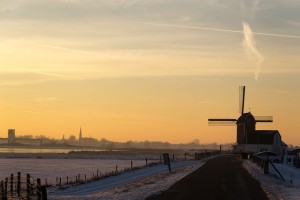 Last Saturday I ended up in an Amsterdam bar in the Jordaan called ‘Café Nol‘ (on Westerstraat), together with Laura. They play sing-along music with many Dutch classics (such as any André Hazes song 😉 ). At one point we heard the song ‘Groot hart’ (‘Big heart’) by Dutch band ‘De Dijk’. It’s a nice song (with interesting Dutch idiom too) and I thought I’d share it with you.
Last Saturday I ended up in an Amsterdam bar in the Jordaan called ‘Café Nol‘ (on Westerstraat), together with Laura. They play sing-along music with many Dutch classics (such as any André Hazes song 😉 ). At one point we heard the song ‘Groot hart’ (‘Big heart’) by Dutch band ‘De Dijk’. It’s a nice song (with interesting Dutch idiom too) and I thought I’d share it with you.
The band ‘De Dijk’ has been around since 1981 and is part of Dutch rock/pop heritage. Read more about the band here.
You can use ‘dijk’ figuratively in the expression: ‘Een dijk van een [noun]’: a great [noun]. Example: ‘De Dijk is een dijk van een band’: ‘De Dijk’ is a great band. Or: ‘Hij is een dijk van een kerel’: he’s a great guy. Note that the [noun] represents a person or (group of persons).
Lyrics
Dokter, kunt u even komen? Breng uw beste medicijn
(Doctor, can you please come (visit me)? Bring your best medicine)
(Ik) heb er nu al jaren last van, ook al doet het niet echt pijn
(I has been bothering me for years, even though it does not really hurt)
Maar ik val voor alle vrouwen, alle vrouwen op dit bal
(But I have a thing for (/ I fall for) all women, all women at this ball (dance) [Note the use of ‘vallen voor iemand’: to fall for somebody (amorously).])
Da’s veel te veel om van te houden, dokter, ik heb een spoedgeval
(That’s way too much to love, doctor, I have an emergency [Note that here the text deviates from the original lyrics that say ‘Het is een spoedgeval’: it is an emergency. This would also be the more common thing to say. A common way to shorten ‘dat is’ in speech is ” da’s “.])
Ik heb een groot hart, dit hart is zo groot
(I have a big heart, this heart is so big)
Het wordt nog mijn dood, dit hart is zo groot
((If it goes on like this) it will be my death, this heart is so big [Note the use of the word ‘nog’: here it captures the feeling of ‘If it goes on like this’ or ‘If I don’t watch out then…’])
Ik heb een groot hart
(I have a big heart)
Neem een ochtend als vanochtend, vroeg op want de zon die scheen
(For example, a morning like this morning, (I) rose early because the sun was shining [Lit. ‘Neem een ochtend als vanochtend’ translates as ‘take a morning like this morning’.])
Opgeruimd loop ik naar buiten, en ik zie een vrouw, ik denk, alleen
(With a clear head I go outside, and I see a woman, I think, alone [Note the use of the adjective ‘opgeruimd’ (cleaned up / organized). I think here he refers to his state of mind, but it could also mean that everything is generally in order (for him).])
Ik dacht dat ze naar me lachte, dus vrolijk lach ik naar haar terug
(I thought she smiled at me, so cheerfully I smile back at her [Note that ‘to smile’ in Dutch is ‘glimlachen’. The verb ‘lachen’ is used for laughing in general, however ‘lachen naar’ takes on the same meaning as ‘glimlachen naar’. ‘Laughing at somebody’ becomes ‘iemand uitlachen’ in Dutch.])
Maar die boom was haar vriend, dokter, komt u vlug?
(But that big guy turned out to be her boyfriend, doctor, (can you) please come quickly? [Note the use of the word ‘boom’: ‘tree’ in Dutch. Also slang for a tall strong guy, e.g. ‘een boom van een kerel’: a very tall and strong guy.])
Ik heb een groot hart, dit hart is zo groot
(I have a big heart, this heart is so big)
Het wordt nog mijn dood, dit hart is zo groot
((If it goes on like this) it will be my death, this heart is so big)
Ik heb een groot hart
(I have a big heart)
Dokter straks is het weer lente, als u begrijpt wat ik bedoel
(Doctor, soon it will be spring, if you know what I mean)
Al dat moois langs ‘s heren wegen, en dan krijg ik dat gevoel
(All those beautiful things along this country’s roads, and then I get that feeling [Note that with ‘al dat moois’ the singer refers to women. A rare example of the use of the genetive case in Dutch is ‘des heren wegen’, oftened shortened to ” ‘s heren wegen”. Literally, ‘roads of the lord’, this generally refers to the public roads (often motor ways) in the Netherlands.])
Loop driemaal daags onder een auto
(When walking, I get hit by a car three times a day [Lit. ‘onder een auto lopen’ translates as ‘to walk under a car’. Note the use of ‘driemaal daags’. This construct works in general for ‘multiple times a day’, e.g. ‘Neem tweemaal daags deze pil in’: takes this pill twice a day. However, it is much more common to say ‘drie keer per dag’.])
Ik stoot dagelijks vijf keer mijn kop
(I hit my head five times a day [Here ‘dagelijks’ means ‘every day’.])
Da’s veel te veel om van te houden, zuster, weet u daar iets op?
(That’s way too much to love, nurse, do you have a solution for that? [In the original lyrics, the singer sticks with ‘doctor’. Note the use of ‘ergens iets op weten’: to have a solution for something (or: to know how to deal with something.])
Ik heb een groot hart, dit hart is zo groot
(I have a big heart, this heart is so big)
Het wordt nog mijn dood, dit hart is zo groot
((If it goes on like this) it will be my death, this heart is so big)
Ik heb een groot hart
(I have a big heart)
Things to remember from this DWOTD
– Dutch band ‘De Dijk‘;
– A common way to shorten ‘dat is’ in speech is ” da’s “;
– The meaning of ‘nog’ in ‘Het wordt nog mijn dood’;
– The difference between ‘lachen’ and ‘glimlachen’;
– The colloquial meaning of the noun ‘boom’;
– The meaning of ” ‘s heren wegen”;
– The use of ‘daags’ and ‘dagelijks’;
– How to use the construct ‘ergens iets op weten’.

 I quit my job end of April and as a result I am officially ‘werkeloos’: unemployed. You may also encounter ‘werkloos’ which means the same thing. I think ‘werkeloos’ is more common in daily speech. Note that the latter can also mean ‘without action / not operating’.
I quit my job end of April and as a result I am officially ‘werkeloos’: unemployed. You may also encounter ‘werkloos’ which means the same thing. I think ‘werkeloos’ is more common in daily speech. Note that the latter can also mean ‘without action / not operating’.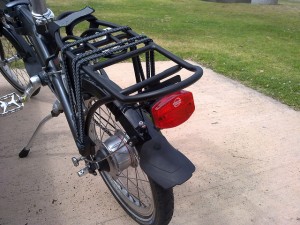 It’s part of Dutch culture to transport a friend or your partner on the rear rack of your bicycle: the ‘bagagedrager’. Although ‘bagagedrager’ in theory can mean ‘any luggage carrier’, in the Netherlands it’s almost exclusively used for bicycles. As the name implies, originally meant for luggage or whatever goods you are transporting, however in practice it is mostly used to transport another human being. In Dutch this is called: ‘iemand achterop nemen’, where ‘achterop’ means something like ‘on/at the back/rear’. When sharing a bicycle, common questions are: ‘Ga jij achterop, of ik?’, ‘Zal ik bij jou achterop gaan?’ and ‘Mag ik achterop?’. When invited you may hear ‘Kom maar achterop’ or ‘Spring maar achterop!’.
It’s part of Dutch culture to transport a friend or your partner on the rear rack of your bicycle: the ‘bagagedrager’. Although ‘bagagedrager’ in theory can mean ‘any luggage carrier’, in the Netherlands it’s almost exclusively used for bicycles. As the name implies, originally meant for luggage or whatever goods you are transporting, however in practice it is mostly used to transport another human being. In Dutch this is called: ‘iemand achterop nemen’, where ‘achterop’ means something like ‘on/at the back/rear’. When sharing a bicycle, common questions are: ‘Ga jij achterop, of ik?’, ‘Zal ik bij jou achterop gaan?’ and ‘Mag ik achterop?’. When invited you may hear ‘Kom maar achterop’ or ‘Spring maar achterop!’.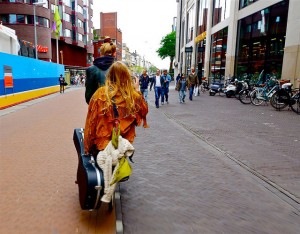 Hopping on the rear rack of a bicycle is somewhat of an art that one must master through practice. You can either sit with one leg on each side of the bicycle (only men do this), or with both legs on one side. The latter is more comfortable, but requires more ‘jumping skills’: you have to hop on while the other is cycling, otherwise it’s too difficult to ‘take off’. However, you should always jump in the direction in which the bicycle is heading, and not perpendicular to it. The latter will distort the balance of the one steering, and will also slow you down. It often helps to push with both hands holding the hips of the one steering. Many Dutch people (such as my girlfriend) still do not master this art 😉
Hopping on the rear rack of a bicycle is somewhat of an art that one must master through practice. You can either sit with one leg on each side of the bicycle (only men do this), or with both legs on one side. The latter is more comfortable, but requires more ‘jumping skills’: you have to hop on while the other is cycling, otherwise it’s too difficult to ‘take off’. However, you should always jump in the direction in which the bicycle is heading, and not perpendicular to it. The latter will distort the balance of the one steering, and will also slow you down. It often helps to push with both hands holding the hips of the one steering. Many Dutch people (such as my girlfriend) still do not master this art 😉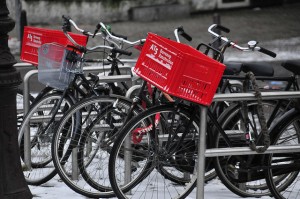 In recent years it has become popular to mount a ‘front rack’ on Dutch bicycles, often equipped with a crate. Although popular, some people find it a nuisance as such bicycles take up more space in the already overcrowded public bicycle stalls 🙂
In recent years it has become popular to mount a ‘front rack’ on Dutch bicycles, often equipped with a crate. Although popular, some people find it a nuisance as such bicycles take up more space in the already overcrowded public bicycle stalls 🙂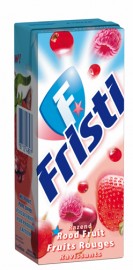 Je
Je